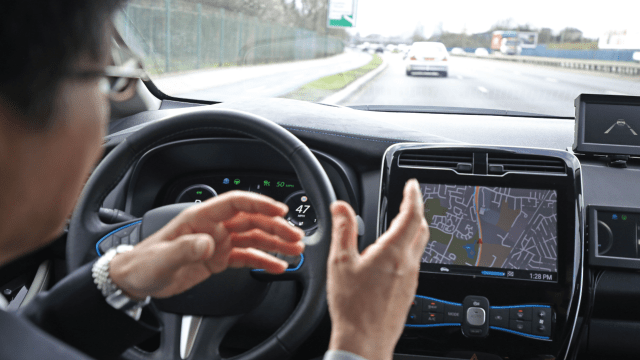
Driverless cars may evoke images from sci-fi films to Saturday morning cartoons, but the prospect is hardly remote now. While Americans today cannot purchase a fully autonomous vehicle, there are some cars that already operate with minimal human assistance and others that are expected to be able to run without human drivers in the future. Several companies like Google’s parent company Alphabet and Amazon have been piloting these vehicles in cities around the U.S. for years.
These advancements have the potential to create both new opportunities and less desirable outcomes. Proponents say driverless vehicles could reduce the stress of commuting, lower the number of accidents and make traveling more sustainable. But critics have raised a number of concerns – ranging from safety risks, to cost, to their potential to hurt the environment by making car travel easier.
This technology has also generated pressing questions related to work, human agency and ethics: How will this impact people who drive for a living? Are Americans willing to give up control to a machine? And whose safety should be prioritized in a potential life-or-death situation?
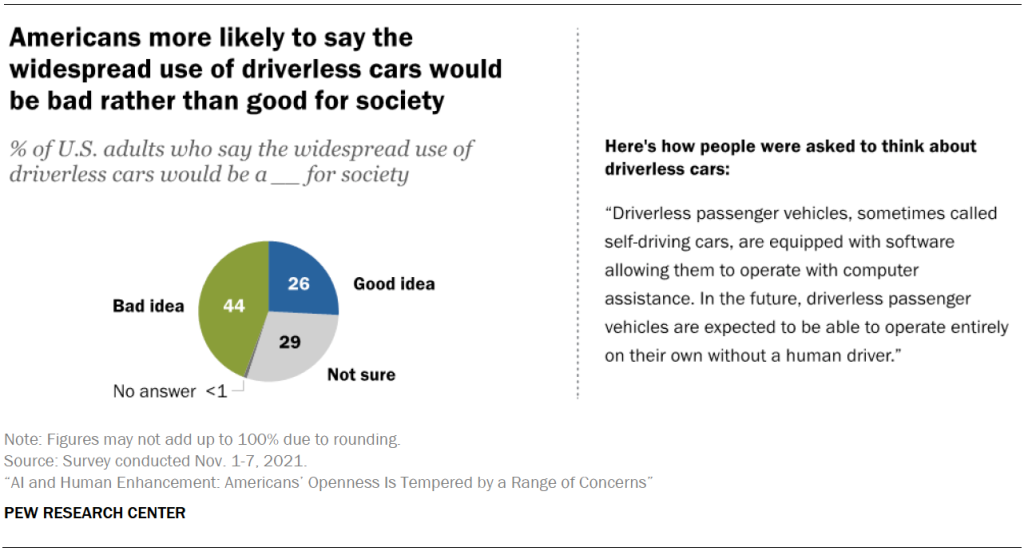
When posed these questions – and more – the survey reveals that larger shares of U.S. adults think the widespread use of driverless passenger vehicles is a bad idea for society than think it is a good idea (44% vs. 26%). Additionally, 29% say they are not sure if this would be a good or bad idea for society.
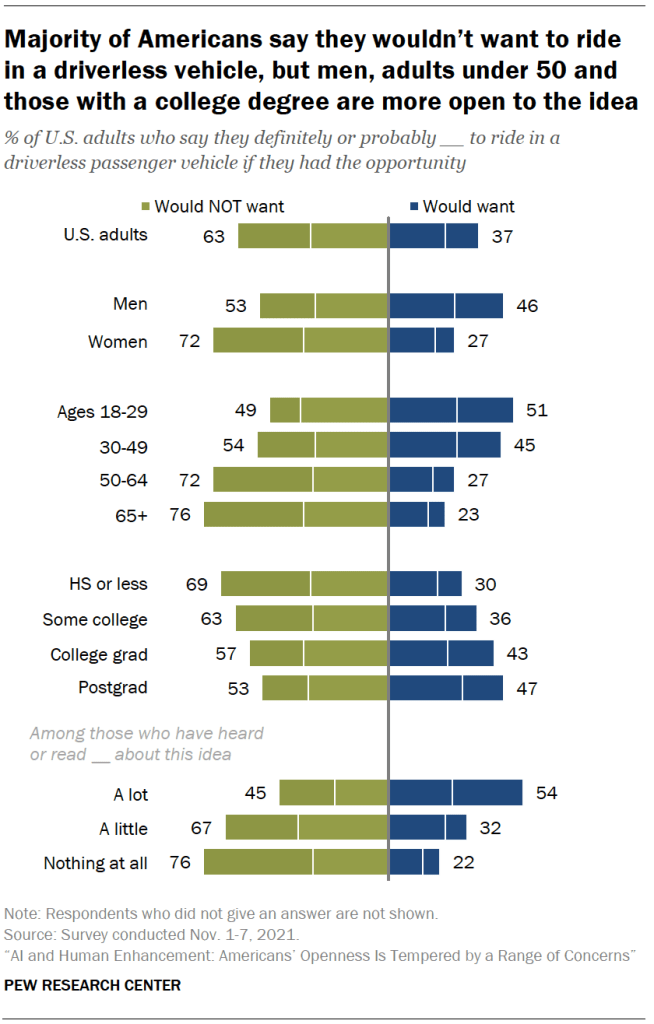
A majority of Americans are also wary about riding in an autonomous vehicle. Roughly six-in-ten adults (63%) say they would not want to ride in a driverless passenger vehicle if they had the opportunity, while a much smaller share (37%) say they would want to do this.
Interest in riding in a driverless vehicle varies across demographic groups, with age being one of the most notable differences. Adults under the age of 50 are about twice as likely as those 50 and older to say they would ride in this type of car (47% vs. 25%).
There are also differences by gender and educational attainment. Some 46% of men say they would want to ride in a driverless car, compared with 27% of women. Additionally, men under the age of 50 stand out for their desire to ride in an autonomous vehicle: 59% of this group say they would want to do this, while those shares drop to about one-third or less among women under 50 and both men and women 50 and older. And those with a bachelor’s or advanced degree are more likely than those with less formal education to say they would ride in an autonomous vehicle. For example, roughly half of those with a postgraduate degree say they would like to ride in one of these cars, compared with three-in-ten of those who have completed high school or less.
Most adults have heard or read at least a little about driverless cars (88%), including 26% who say they have heard or read a lot. Only 12% of adults say they have heard nothing at all about driverless cars. And those who have heard more about driverless cars are also more likely to want to ride in them. Some 54% of those who have heard a lot say they want to ride in driverless cars, compared with 32% of those who have heard a little and about one-in-five who have heard nothing at all.
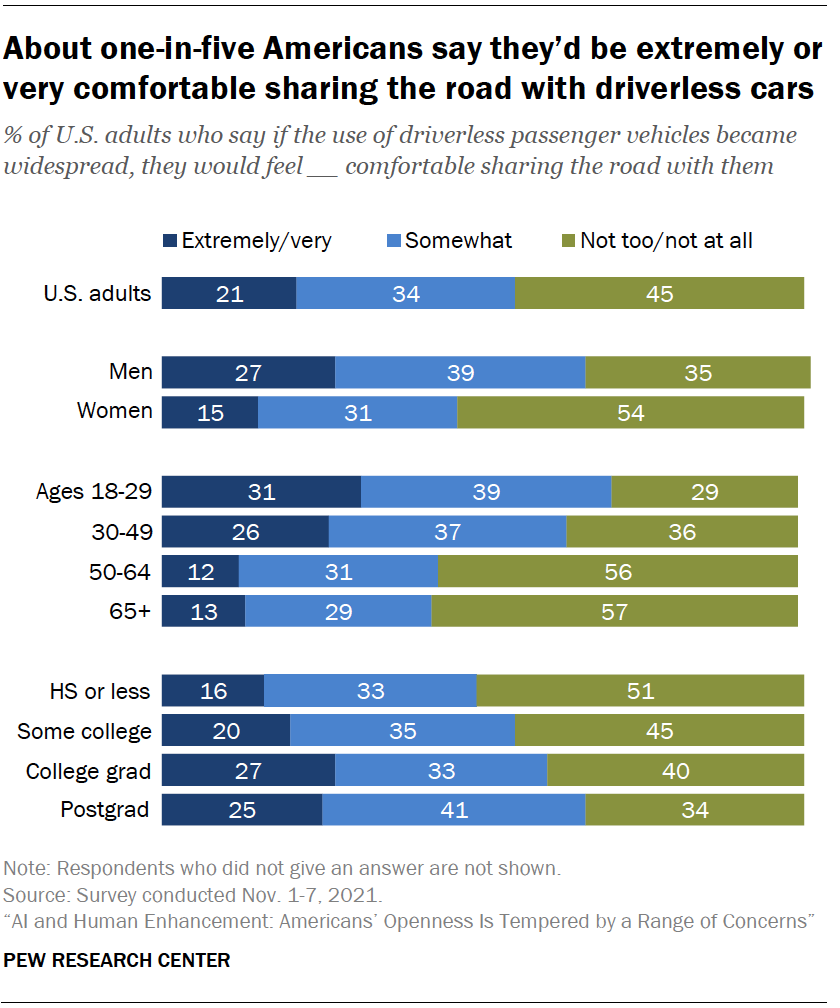
Many Americans are not only reluctant to ride in driverless cars, some are also concerned about sharing the road with one. In total, 45% of Americans say they would not feel comfortable sharing the road with driverless vehicles if use of them became widespread, including 18% who would not feel comfortable at all. Smaller shares indicate they would be extremely (7%) or very (14%) comfortable sharing the road with autonomous vehicles.
As was true with wanting to ride in a driverless vehicle, men are more likely than women to say they would be extremely or very comfortable sharing the road with these types of cars (27% vs. 15%). Conversely, 54% of women say they would be uncomfortable with this compared with 35% of men. There are also gaps by age, with adults under 50 being more comfortable with sharing the road with driverless cars than those 50 and older. And those with a bachelor’s degree or more are more likely than those with less formal education to say the same.
A 2017 Pew Research Center survey also measured the public’s views about riding in or sharing the road with autonomous vehicles. While figures are not directly comparable across these two surveys due to changes in question wording, there are clear patterns that emerge in both. Then, as now, a majority of Americans were not interested in riding in a driverless vehicle, and many were wary of sharing the road with vehicles. And those who are more open to this technology continue to skew younger, male or college-educated.
Those who have heard a lot about driverless cars more likely than those who have heard nothing to think they are a good idea
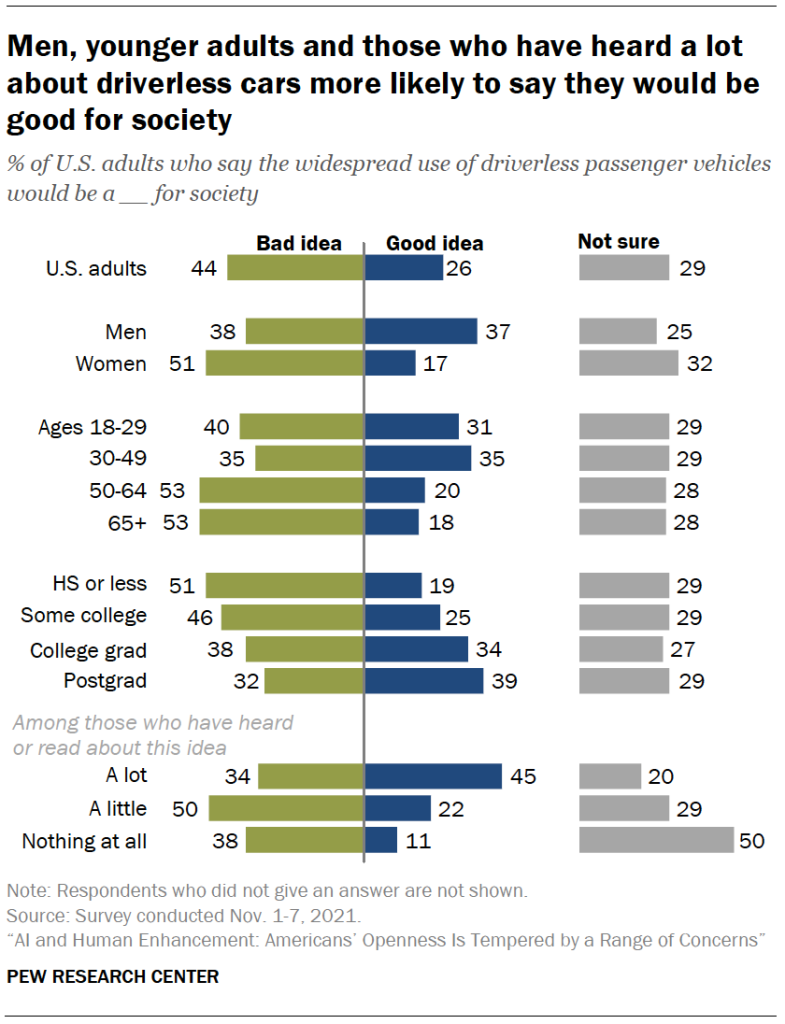
Many of the groups who are more likely to say they would ride in a driverless vehicle are also more likely to say these cars are a good idea for society. For example, adults ages 18 to 49 are more likely than those 50 and older to say driverless cars are a good idea (33% vs. 19%). Men and those with more formal education are also more likely to perceive these cars as a good idea for society.
Those who have heard a lot about driverless cars (45%) are about twice as likely as those who have heard a little (22%) to say they’re a good idea, and about four times as likely as those who have heard nothing at all (11%) to say the same.
Relatedly, those who think driverless cars are a good idea on a societal level are also more likely to want to ride in one themselves. Most adults who say driverless cars are a good idea for society say they would want to ride in one (86%), while most who see these vehicles as a bad idea say they would not want to ride in one (89%).
Public foresees a mix of both positive and negative outcomes if driverless cars become widely used
Americans were asked about several possible outcomes that may occur if driverless cars become widely used, and the findings show the public thinks there could be both pros and cons.
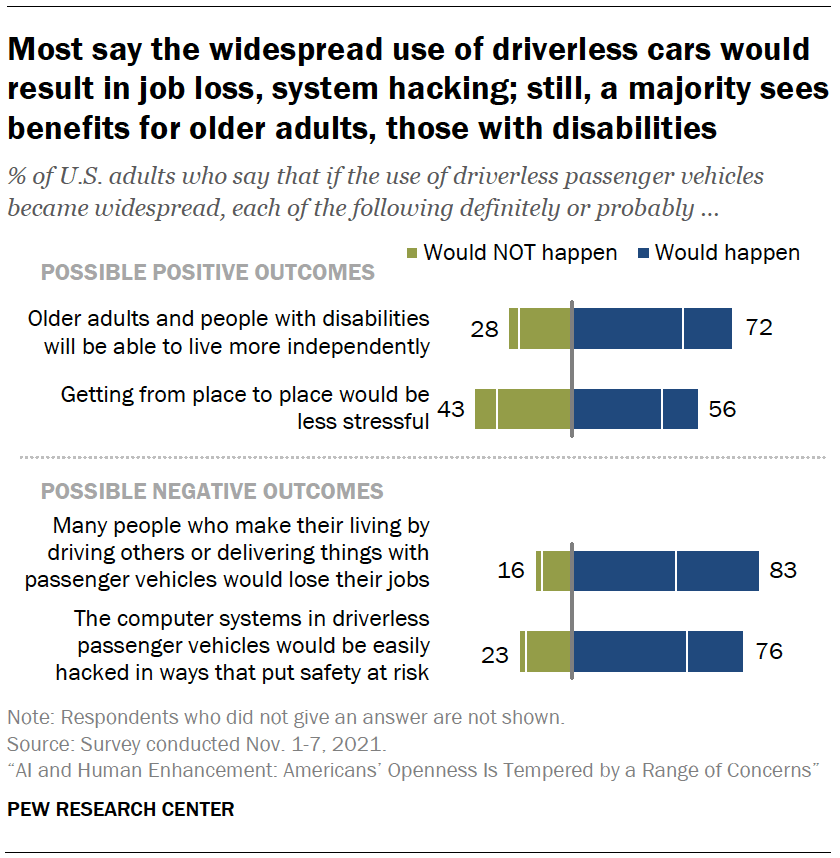
When it comes to possible positive outcomes, 72% say that older adults and people with disabilities would definitely or probably be able to live more independently with widespread use of driverless cars, while 56% say getting from place to place would definitely or probably be less stressful. Still, about four-in-ten do not think autonomous vehicles would alleviate the stress of going places.
On the more negative side, clear majorities say that the widespread use of driverless cars would definitely or probably lead to many people who make a living by driving others or delivering things with passenger vehicles losing their jobs (83%) or that computer systems in the vehicles would be easily hacked in ways that put safety at risk (76%).
Those who generally think driverless cars would be a good idea for society are more likely than those who think they would be a bad idea to say positive outcomes would occur with widespread use. Roughly half of adults who think these vehicles are a good idea say older adults and people with disabilities would definitely be able to live more independently, compared with 8% of those who say driverless cars would be a bad idea. Similarly, only 14% of those who think driverless cars are a good idea say the computer systems would definitely be easily hacked, compared with 37% of those who think these cars are a bad idea.
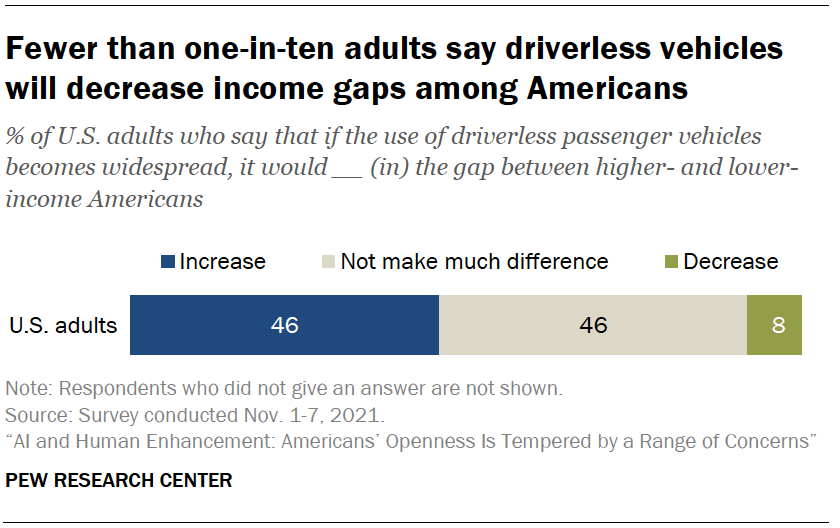
When asked about the potential impact that the widespread use of driverless passenger vehicles could have on income inequality, 46% say these vehicles would increase the gap between higher- and lower-income Americans, while much smaller shares (8%) expect the economic gaps to decrease. Still, 46% think these disparities would not change if the use of autonomous vehicles became widespread.
Mixed views on whether driverless vehicles would increase or decrease traffic deaths, injuries
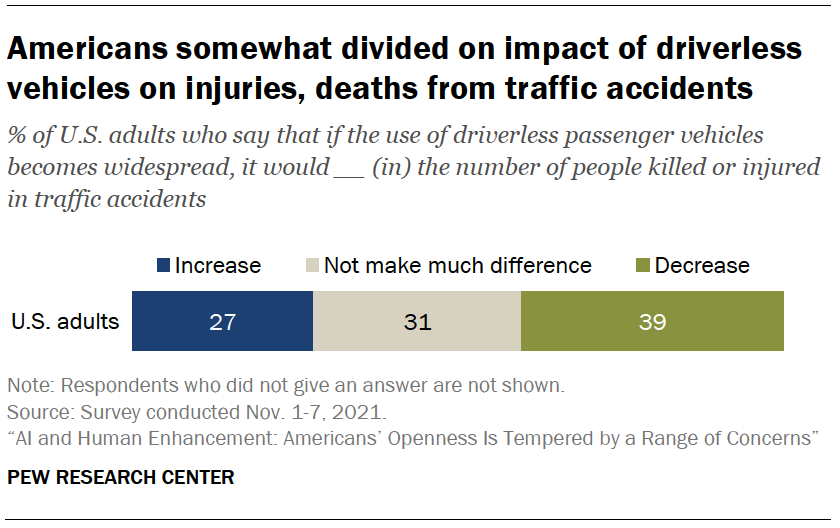
A central question about the deployment of autonomous passenger vehicles is whether these cars would help reduce traffic accidents or instead lead to more injuries or fatalities. This survey finds that 39% of Americans say the widespread use of driverless vehicles would decrease the number of people killed or injured in traffic accidents, and 27% believe traffic deaths and injuries would increase. Another 31% say it would not make much difference.
A 2017 Center survey also found mixed views on whether driverless cars would reduce traffic injuries or deaths. The current figures cannot be directly compared to the previous survey due to changes in question wording, but it does highlight that even with advancements and investments in driverless vehicle technology, the public remains divided on the impact these cars will have on traffic safety.
About four-in-ten are unsure if driverless car systems should prioritize safety of passengers or those outside vehicle if an accident is unavoidable
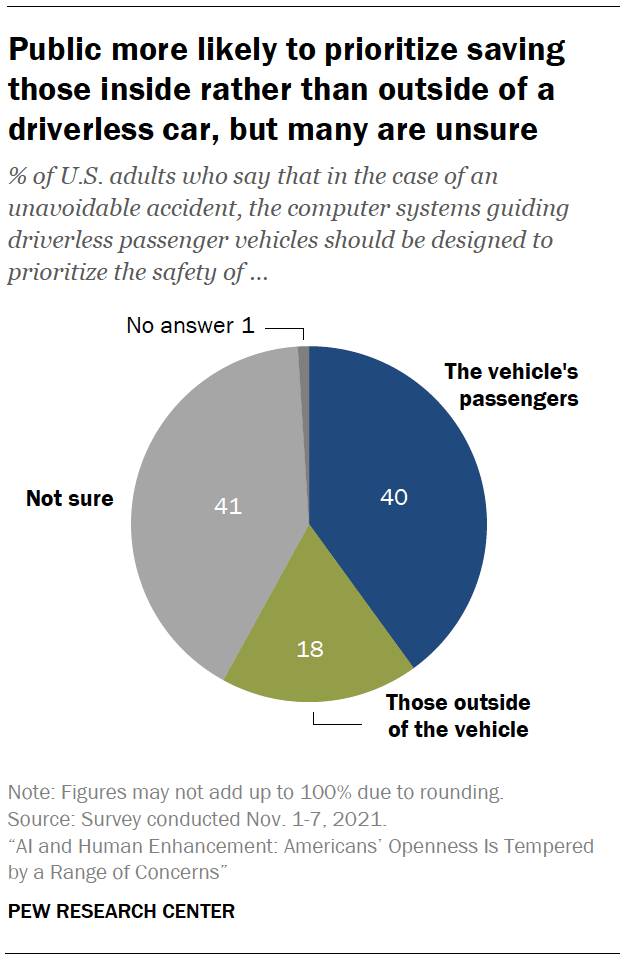
One of the most well-documented debates regarding driverless cars centers on the “trolley problem.” It is the ethical dilemma of whether a trolley driver who is on a collision course with pedestrians should take action and switch tracks to save several people, even if it results in killing just one person, or if the driver should do nothing in order to spare the life of the single pedestrian, thereby dooming several others.
Software developers, industry leaders and safety experts must grapple with the modern version of this question of whose safety should be the priority in the event of a coming accident involving an autonomous vehicle. This is a question that some experts themselves are unsure of how to answer, while others critique the usefulness of this framing altogether.
In this survey, larger shares say that in the case of an unavoidable accident, the computer system guiding the driverless car should prioritize the safety of the vehicle’s passengers, rather than those outside of the vehicle (40% vs. 18%). But some are also uncertain of what these systems should be programmed to do: 41% report being unsure whose safety should be prioritized in the case of an unavoidable accident.
Who should have a role in setting driverless passenger vehicle standards, and to what degree?
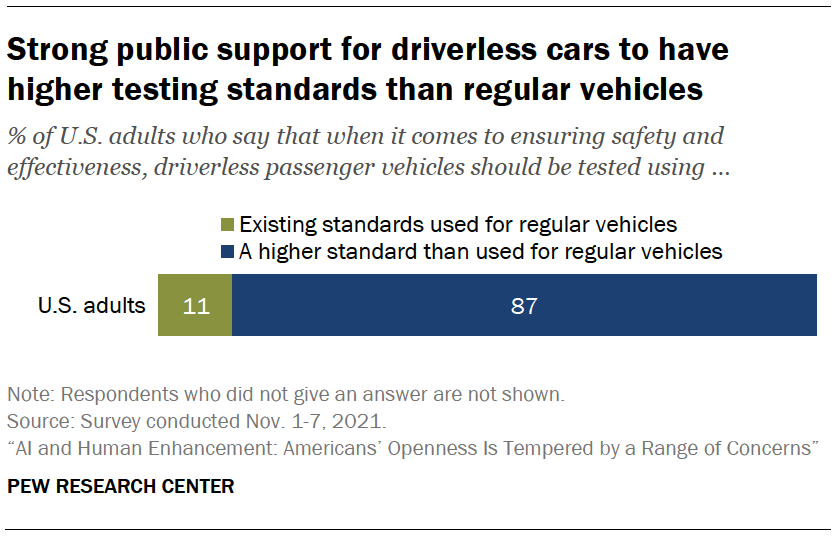
The U.S. Department of Transportation has been mapping safety standards and plans for introducing autonomous vehicles onto the nation’s roadways. Accordingly, this survey explored people’s views about the scope of those regulations and which groups should be involved in setting the standards.
There is strong agreement among Americans that the standards used to test the safety of regular vehicles are inadequate when it comes to driverless ones. A clear majority of Americans (87%) say driverless vehicles should be tested using a higher standard than is used for regular vehicles. Only 11% believe that existing standards used for regular vehicles would be enough to ensure the safety and effectiveness of autonomous vehicles.
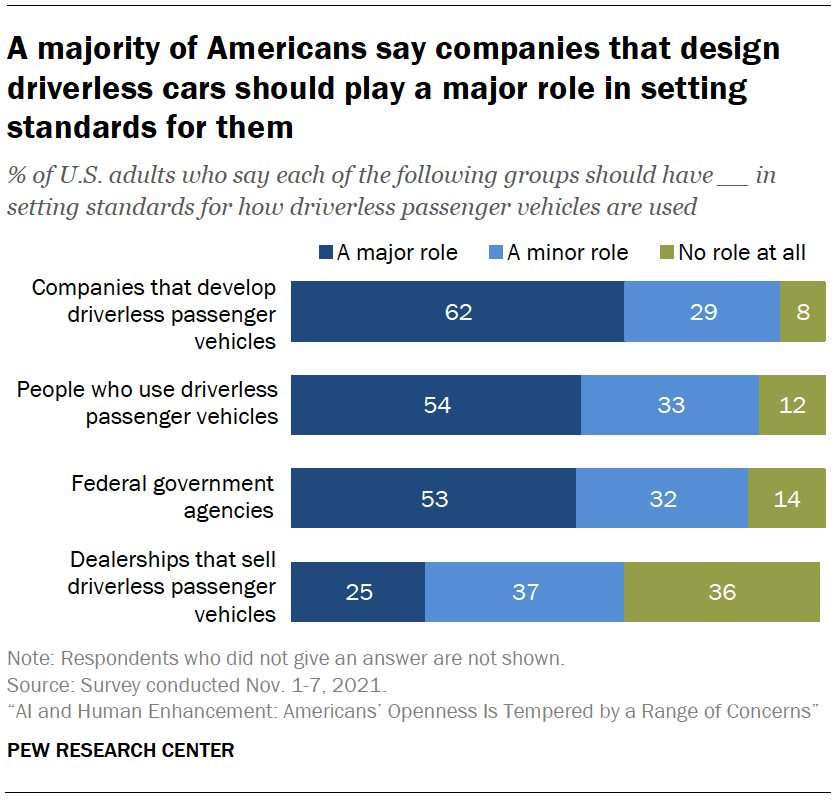
In addition to understanding the types of standards people want to see, Americans were also asked to weigh in on the level of involvement they would like to see certain groups play when it comes to setting these standards for how driverless vehicles are used.
Some 91% of Americans say the companies that develop driverless passenger vehicles should play a role in setting standards for how these vehicles are used. And 62% say they should play a major role.
Similar shares say the individuals who use these driverless vehicles and the federal government should have a major role in this process (54% and 53%, respectively). There are some differences by party when it comes to how much of a role the federal government should have in setting standards: 66% of Democrats and those who lean toward the Democratic Party say it should have a major role, compared with 38% of Republicans and Republican leaners who say the same. And 20% of Republicans say the federal government should have no role at all.
Meanwhile, the public is less enthused about having car dealerships that sell driverless passenger vehicles playing a major role in setting standards – with 36% saying they should have no role at all.
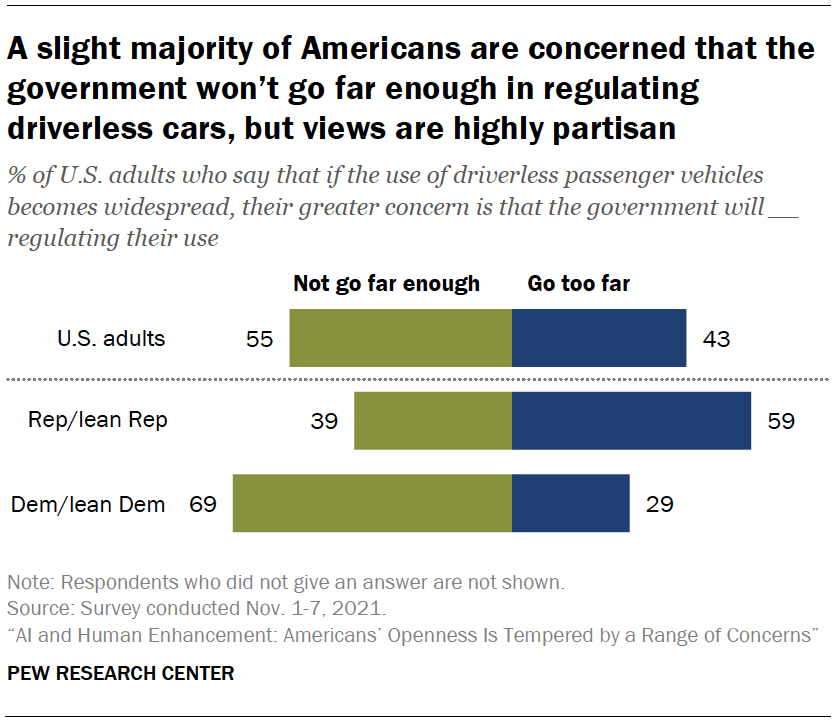
When asked to share their views about the level of regulation that may be in store for autonomous vehicles, 55% say their greater concern is that the government will not go far enough in regulating the use of driverless passenger vehicles, while a smaller share (43%) says the government will go too far.
Roughly seven-in-ten Democrats (69%) say their greater concern is that the government will not go far enough in regulating the use of driverless vehicles in the event it becomes widespread. Republicans’ views tilt in the opposite direction: 59% say they are more concerned that government will go too far in regulating these cars.
A majority of Americans say some ideas would make the use of driverless vehicles more acceptable
While a large share of the public is wary of riding in or sharing the road with autonomous vehicles, people say there are steps that could be taken to make the use of driverless cars more acceptable to them.
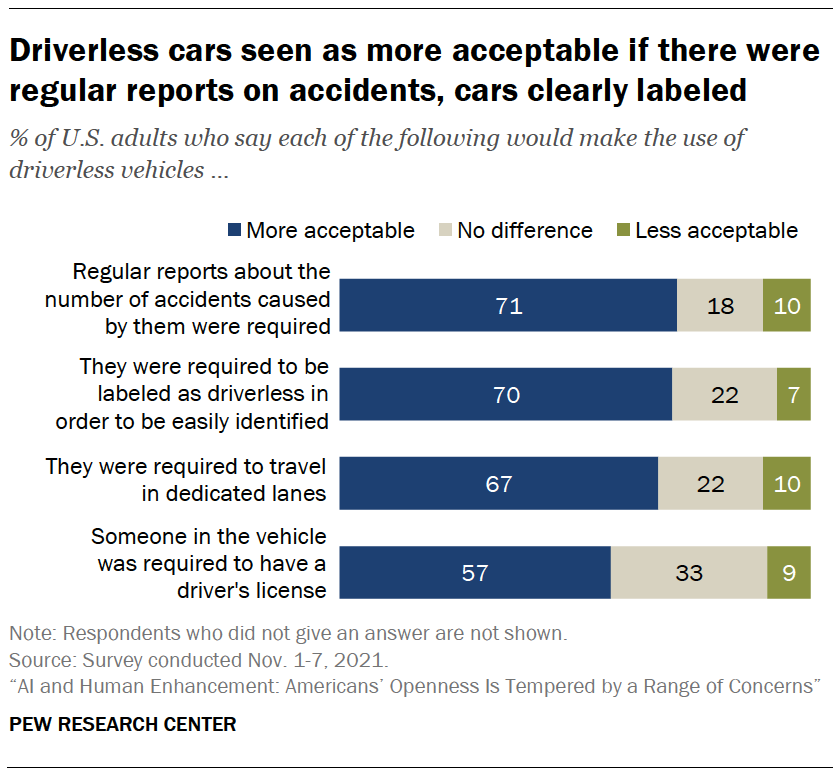
About seven-in-ten Americans say driverless passenger vehicles would be more acceptable if regular reports about the number of accidents caused by them were required (71%), if autonomous cars were labeled as driverless in order to be easily identified (70%) and if such cars were required to travel in dedicated lanes (67%). Some 57% say use of driverless cars would be more acceptable if someone in the vehicle was required to have a driver’s license. Still, a third of Americans say someone having a license would make no difference in how they view driverless cars.
Mixed views on deploying driverless technology in some other kinds of vehicles; opinions on using this software in 18-wheelers are negative
Driverless technology systems can be employed for a variety of purposes. And Americans have reservations about automating other kinds of transit – especially 18-wheeler trucks. Roughly six-in-ten (59%) say they oppose the use of technology used to operate driverless passenger vehicles in these trucks, with just 20% in favor of this.
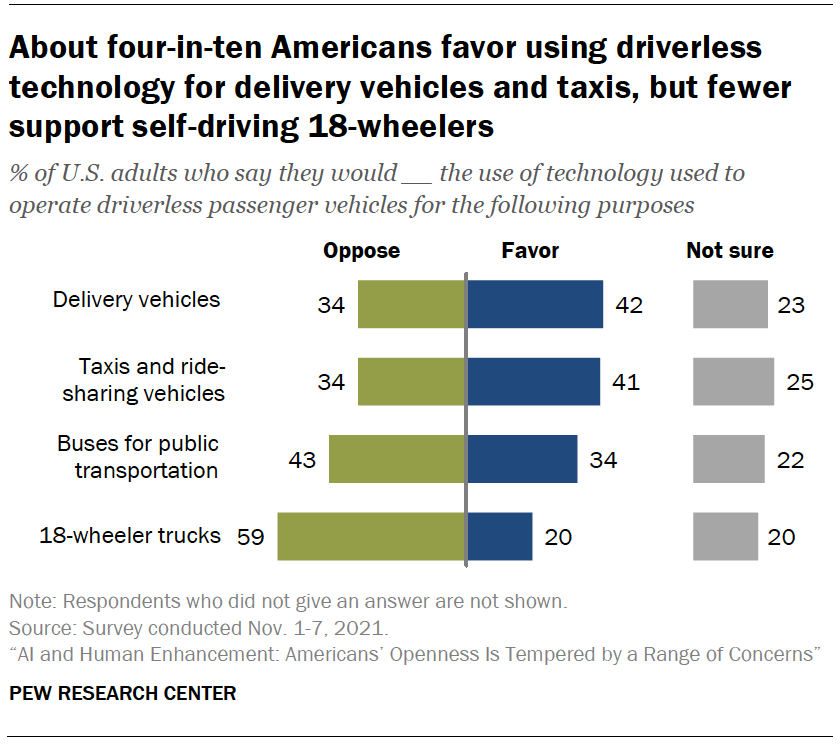
Sentiment regarding using these technologies in other modes of transportation is somewhat more divided. While 43% say they oppose the use of driverless technology in public buses, 34% are in favor of this. And when it comes to views about driverless delivery vehicles or taxis and ride-sharing vehicles, about four-in-ten each are in favor of using the technology for this purpose. Still, about one-third are opposed to this.
Across each of the types of vehicles measured in this survey, there is some level of uncertainty about how they feel about the technology. For example, 25% of Americans are unsure if the technology used in driverless passenger vehicles should be used in taxis and ride-sharing vehicles.




